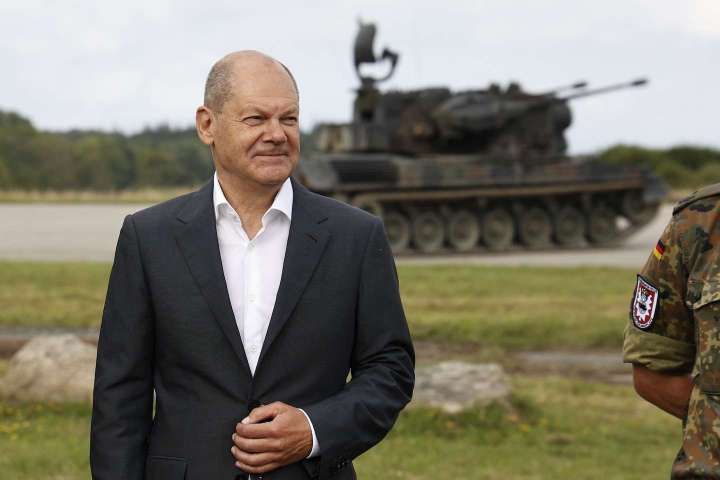Psychologists tell us that human beings are hard-wired with a “negativity bias” — meaning that we’re overly sensitive to bad news. And there is lots of it out there these days: the war in Ukraine, democratic travails in the United States, floods in Pakistan, drought in China (among other grim stories). But we often miss the good news, especially if it doesn’t come in the form of a single event. One of the most striking positive trends in the world these days can be found in the democratic strength, character and leadership of Germany.
In tough times, don’t lose sight of Germany’s unlikely success story

This came to mind as I was reading German Chancellor Olaf Scholz’s speech this week in Prague, in which he promised that his country would support Ukraine “reliably and for as long as it takes.” He explained that Germany had “undergone a fundamental change” on providing military aid to Ukraine. He affirmed Germany’s support for a stronger, more integrated Europe — one that would welcome new members that aspire to Europe’s democratic values and ideals. This is all part of what he calls a Zeitenwende in German foreign policy, a “turning of the times.”
On one level, this is indeed a dramatic shift. Yet, it is also the continuation of a remarkably consistent German attitude toward Europe and the world since 1945. Think about how different the world would look if we did not have, at the center of Europe, its most powerful nation — the country that is the largest net contributor to the E.U. — totally committed to democratic and liberal values and willing to make sacrifices for them. Germany today is the rock on which a new Europe is being built.
And the sacrifices are real and deep. Natural gas prices are up tenfold in Europe compared to last year. The price of electricity for 2023 is more than 15 times higher than it has been in recent years, by one estimate. Vladimir Putin is ramping up the pressure by slowing and even stopping gas exports to Germany, a country he thinks he knows very well because of his years serving there in the KGB.
Follow Fareed Zakaria‘s opinions
FollowBut Germany has not given in. Confronted with these massive challenges, it has patiently sought to diversify away from a dependence on Russia, investing even more in green technology, buying liquefied natural gas, reopening coal-fired plants and even debating whether to keep its last three nuclear power plants running longer than planned. (It should.) The European Union has suggested a 15 percent reduction in the consumption of natural gas this winter. Germany is trying to achieve a 20 percent cut just to be safe. German industry is being resourceful about energy efficiency, and companies are even thinking about sharing resources with competitors, all to get through the crisis.
Initially Scholz was regarded as a lightweight, unable to match the gravitas and leadership skills of his predecessor Angela Merkel. But Merkel herself was seen in similar ways when she came to power. Over time she developed the skills and stature to gain respect from all quarters. She might have erred in trying to develop too conciliatory a relationship with Moscow, but when Russia invaded Ukraine in 2014, she was at the forefront in condemning it and persuading Europe to impose an ambitious program of sanctions. She also led the world in responding to the Syrian refugee crisis, reassuring her country by declaring, “We can do this.” As of mid-2021, Germany hosts more than 1.2 million refugees, half of whom are from Syria. In fact, Germany has managed this stunning act of integration with minimal problems.
We always underestimate modern-day Germany and its leadership. The federal republic has had a remarkable run of leaders in the post-World War II era, from its first chancellor, Konrad Adenauer, to Willy Brandt to Helmut Schmidt to Merkel — and now, let’s hope, to Scholz. Can any other country compare over the past seven decades?
I remember the reaction to Helmut Kohl, who was called a “colorless man from the sticks” because he did not come from the country’s elite class. Yet he proved to be the man who succeeded in reunifying Germany while keeping it firmly anchored in the West. Germans have paid for that integration on a scale that is almost unimaginable, investing about 2 trillion euros in the East over the course of two decades, according to one estimate.
In 1945, no one would have predicted that Germany would develop as it has. It came out of the war utterly destroyed, its cities flattened, its population starving. Around 12 million ethnic Germans who had been expelled from other countries poured into Germany. Above all, postwar Germany was scarred by the gruesome legacy of Adolf Hitler and the Holocaust. But the country found a way to overcome its past, to become, in Henry Kissinger’s words, “a normal country … with an abnormal memory.” And that much larger Zeitenwende is one of the great good news stories of our times.






